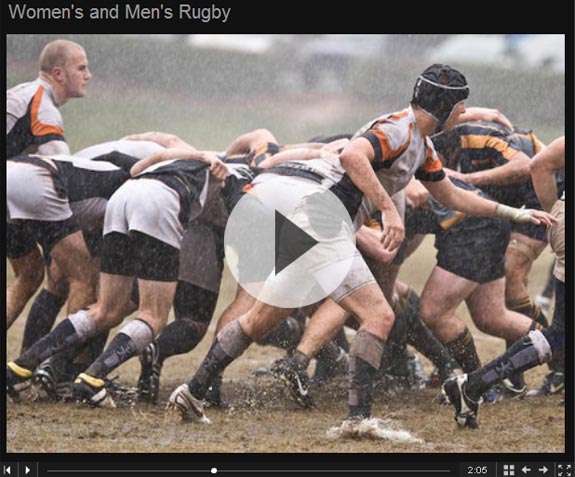Inside the Scrum
Men’s and women’s rugby teams take on the best in the country

The first hints of autumn ride on the breeze of a Saturday afternoon in Charlottesville as throngs of fans file toward Scott Stadium, their chatter soon to become cheering for the Cavaliers in yet another gridiron confrontation.
Few pause as they pass Mad Bowl, where another battle of athletic prowess is under way. Athletes grunt as they collide, then strain in scrums like huddled warriors, their cleats clawing at the turf for precious yards toward a distant goal.
It’s UVA club rugby, and while the sport doesn’t command the same attention or hoopla as its helmeted cousin, it shares the sweat, grit, camaraderie and rugged pride.
“We compete against some of the best schools in the country,” says Chris Colliton (Com ’10), president of the UVA men’s rugby club. Formed in 1961 and currently coached by Neil Livett, the club competes in the Mid-Atlantic Rugby Football Union, “one of the best leagues in Division 1 collegiate rugby.”
The women’s club, coached by Nancy Kechner (Educ ’83, ’05), is no stranger to the elite circles of the sport, with eight Virginia Rugby Union championships. “We’ve been to 11 straight Sweet Sixteens, and we’ve been to two Final Fours,” says Kechner. “We’ve had years of success.”
Despite the competition, both clubs encourage newbies.
“I hadn’t even seen rugby before I came to UVA,” says Sharlin “Rancho” Carter, a second-year nursing student. “I wanted to try a new sport, and I saw the chalkings of a rugby info session, and [I thought], ‘Rugby is the one where they hit people with no pads. Why not give it a look?’”
Now she’s an outside back in a sport that, though unfamiliar to many Americans, is enjoying increased popularity on many levels. In October, it was added as an Olympic sport, and participation just at the college level has grown by more than 24 percent since 2005, according to USA Rugby.
“Collegiate competition now has become very intense,” says Livett.
Perhaps even stronger is the sense of camaraderie. “These guys are like a family,” says Kechner. “They support each other on the field, off the field, and they study together. They enjoy themselves, and they get a lot out of it.”
FROM THE ARCHIVES
Read an article from the 1966 edition of Alumni News called “Rugby: For those who play for fun”